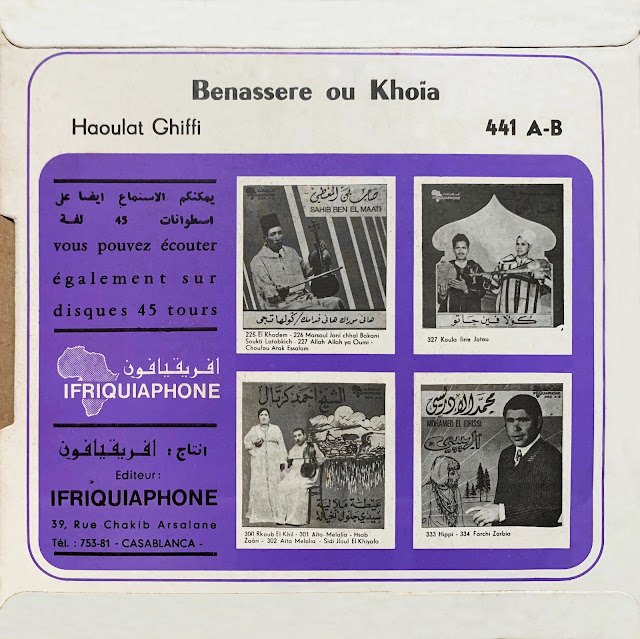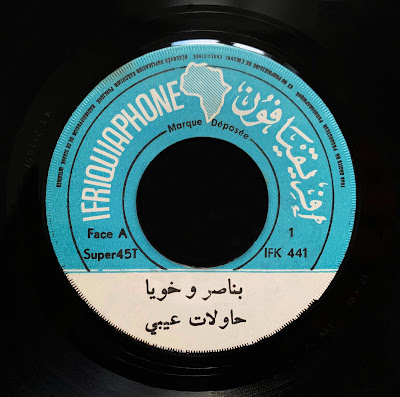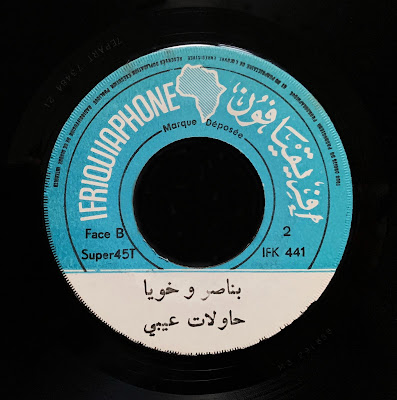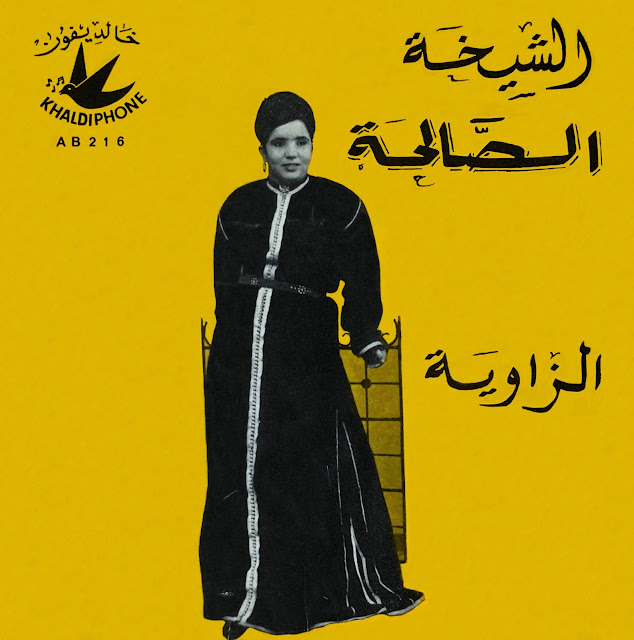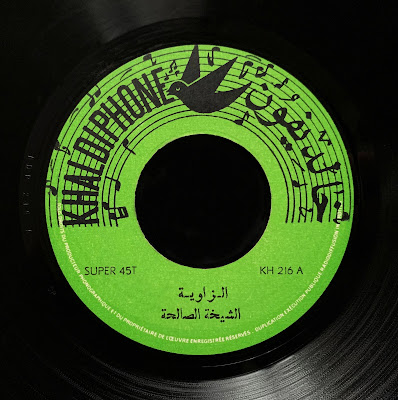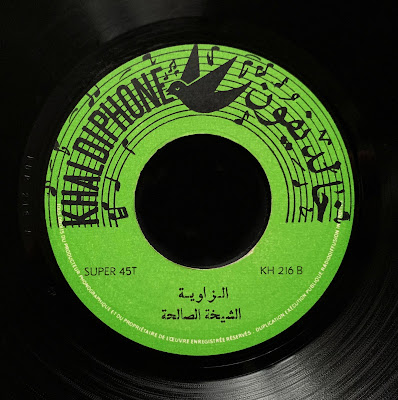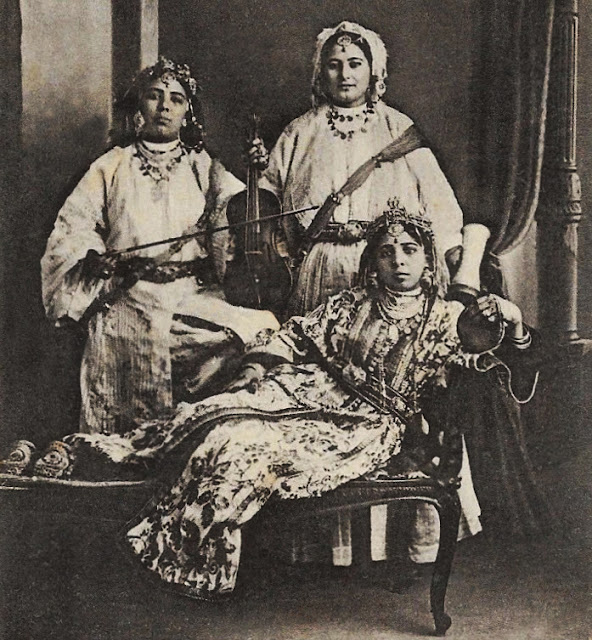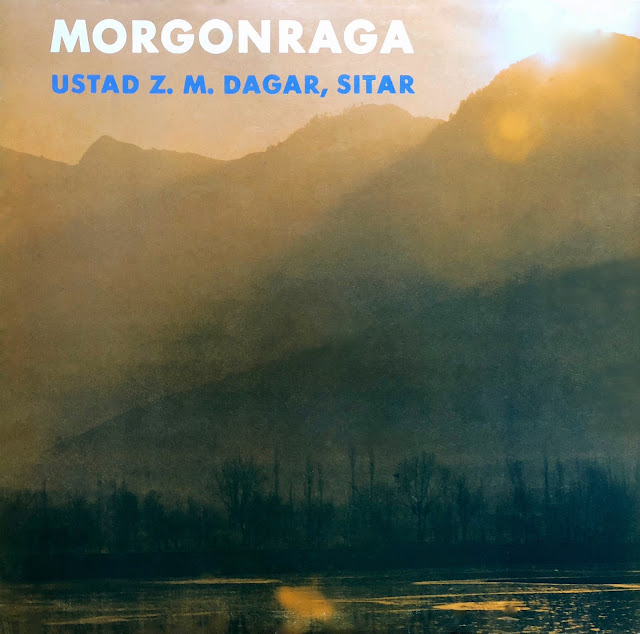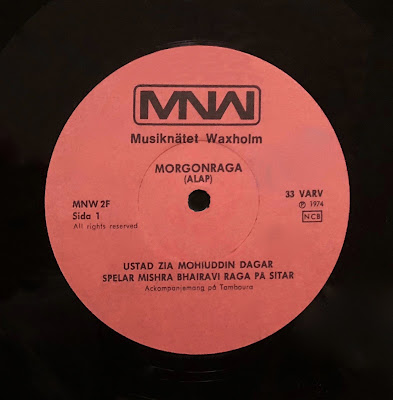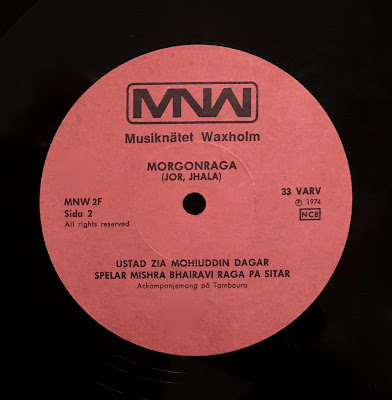MOROCCO – MAROC
Bennasser Ou Khoia / بناصر وخويا / and Cheikha Hadda Ouakki – Ifriquiaphone IFK 441 A-B (Vinyl 7 inch, 45 RPM)
We round off our series of Moroccan 7-inch posts with this superb Bennasser Ou Khouya (b. 1939) disk on the Ifriquiaphone label. His traditional music and repertoire, in Amazigh and Arabic, was extremely popular throughout Morocco during Ou Khouia's musical career, which spanned from the mid-1960s until his retirement in 1984.
The group’s excellence also owes much to the accomplished female singer Cheikha Hadda Ouakki (b. 1953), who joined Ou Khouya’s group in 1969. Ouakki is a famous Amazigh singer in her own right, and pursued a successful solo career that continues to this day.
This absolutely brilliant album showcases the iconic duet’s eloquent, fluid and fiery vocals, accompanied by masterful violin – played upright like the traditional rebab – clapping, and a bendir frame drum.
Nous concluons notre série de posts de 45 tours marocains avec ce superbe disque de Bennasser Ou Khouya (b. 1939) sur le label Ifriquiaphone. Sa musique traditionnelle et son répertoire en amazigh et en arabe jouissaient d’une grande popularité dans tout le Maroc au cours de sa carrière musicale allant du milieu des années 1960 à sa retraite en 1984.
La remarquable musique d’Ou Khouya doit également beaucoup à la présence de la formidable chanteuse Cheikha Hadda Ouakki (née en 1953) qui rejoint sa formation en 1969. Cheikha Hadda Ouakki est une chanteuse amazighe de premier plan qui poursuivra une grande carrière solo.
Cet album brillant présente le chant particulièrement éloquent, fluide, et dynamique du duo emblématique, soutenu par un violon lyrique, joué verticalement comme le rebab, des battements de mains, et un tambour sur cadre bendir.
***
In collaboration with Joao and Hakim, we have to date collected a quality selection of some 200 Moroccan 7-in records on 28 different labels. Our goal is to gradually map out this vast, forgotten recorded heritage thanks mostly to Hakim in Marrakech who finds good copies of rare 45 RPMs which we then record, edit and scan. Hakim also seeks out information about the artists, labels and their catalogues. Joao plans to start recording Moroccan shellac 78 RPMs shortly. These recording are constantly being added to Hakim’s Youtube channel*, and I’ll continue to share some of our great finds with you on this blog.
En collaboration avec Joao et Hakim, nous avons à ce jour collecté une sélection qualitative d'environ 200 45 tours marocains sur 28 labels différents. Notre objectif est de cartographier progressivement ce vaste patrimoine musical enregistré difficile d’accès surtout grâce à Hakim à Marrakech qui sait où dénicher des bonnes copies de 45 tours rares que nous enregistrons, éditons et scannons. Hakim recherche également des informations sur les artistes, les labels et leurs catalogues. Joao prévoit d’enregistrer des 78 tours marocains sous peu. Ces enregistrements viendront enrichir la chaîne Youtube* d’Hakim et je partagerai quelques-unes de nos belles trouvailles sur ce blog.
*Hakim’s Youtube channel l La chaîne Youtube d’Hakim here
Our other Middle-Atlas Berber music posts:
Bennacer Ou Khouya with Cheikha Hadda Ouakki – Folklore du Moyen Atlas – Atlassiphone ATLS 1900 here
Bennasser Ou Khoia with Cheikha Hadda Ouakki - Khaldiphone KH 2046 here
Bennasser Ou Khoia with Cheikha Hadda Ouakki – Ifriquiaphone IFK 381 here
Cheikh Baïza Mohamed – Koutoubiaphone KTP 1280 here

